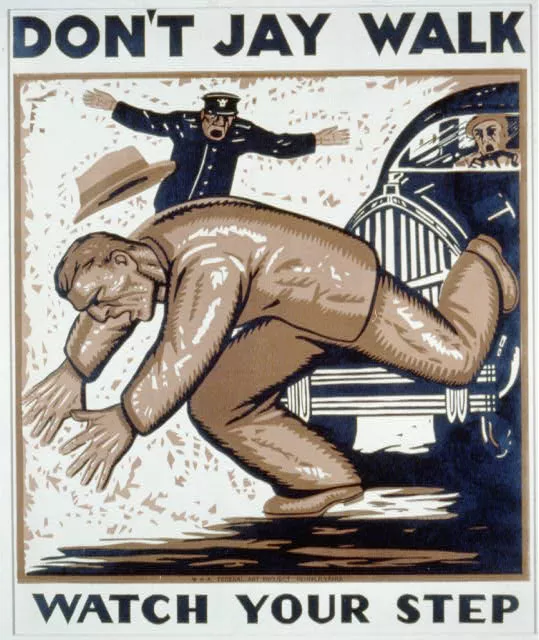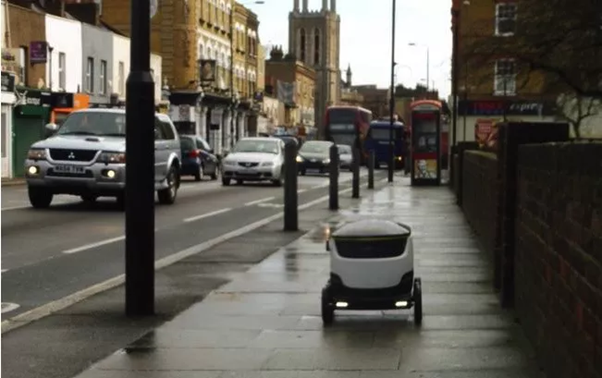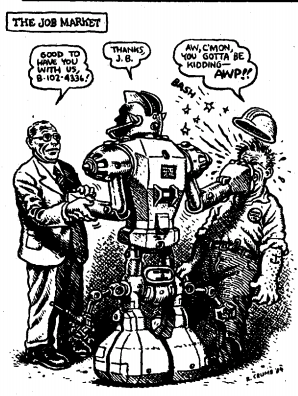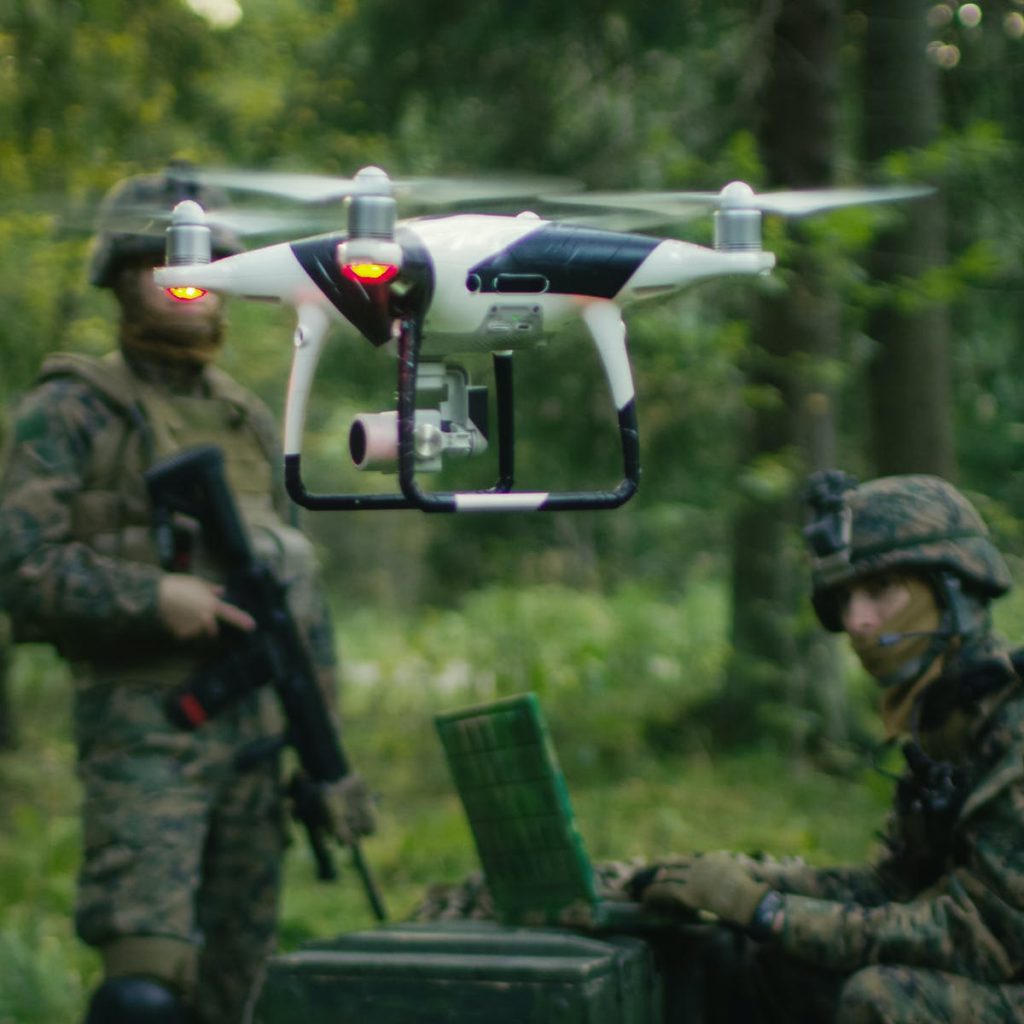“Economists explain how production takes place in the above-mentioned relations, but what they do not explain is how these relations themselves are produced, that is, the historical movement that gave them birth.” – Karl Marx, The Poverty of Philosophy.
The nature of productive forces is not ideologically neutral. Science, technology and machinery are devoted and subordinate to capital. The Marxists who treat socialism as an inevitable result of expanded production revise the core essence of Marxism: revolutionary struggle.
A Marxist who upholds dialectical materialism knows that the productive forces are not as simple as determinists might suggest. In fact, capital controls the productive forces. Capital not only limitedly develops the productive forces quantitatively but also shapes them qualitatively to fit the interests of accumulating capital. In turn, the productive forces do not refer simply to machinery and material things; they are an assemblage of technology and people. They contain a relationship between worker and machine in which the worker has conscious agency.
This relationship is defined not only by the tools and materials but by the productive capacity of labour itself. The workers are just as much a productive force under capitalism and therefore, the relations of production have a distorting effect on the nature of the means of production themselves. From this follows that the productive forces cannot be disregarded and viewed independent from the social order of capitalism. The “development of the productive forces” under capitalism and capitalist relations is merely the development of capital, of dead, crystallised labour, at the expense of living labour.
Marx said that “capital is dead labour, that, vampire-like, only lives by sucking living labour, and lives the more, the more labour it sucks”. Thus, capital is nothing but the exploitation of workers through the robbery of the surplus value they produce. If production were socialised, capital would seize to exist because concrete labour would dominate and be dedicated to social need and not greed.
The development of the productive forces and technology under capitalism simply exists to facilitate this exploitation and robbery. This is unsurprisingly why most of the technological development under capitalism occurs in the military [1], the foundation of capitalist economies.[2]
Technology under capitalism is a threat of which we need to be aware. For instance, when artificial intelligence (AI) makes decisions on nuclear weapons, the fate of humanity is at stake. “Autonomous machines with the power and discretion to select targets and take lives without human involvement are politically unacceptable, morally repugnant and should be prohibited by international law”, in the word of UN Secretary-General António Guterres.
Particularly, the threats of AI and technology are exposed in the military-industrial complex. Military artificial intelligence could potentially accelerate combat to the point where the actions of machines surpass the mental and physical capabilities of those making the decisions in the command posts of a future war. Therefore, technology will outpace strategy, and human and machine errors will most probably merge with unpredictable and unintended consequences.
The socialists who do not grasp this nature of technology – positing instead that it is a neutral tool that the working class can use – might also be making the same mistakes about the nature of capital itself. It is not the individuals that make up the bourgeoisie that are the problem; individual capitalists do not run capitalism; capital runs capitalism.
Marx explains in Grundrisse, “the idea held by some socialists that we need capital but not the capitalists is altogether wrong. It is posited within the concept of capital that the objective conditions of labour – and these are its own product – take on a personality towards it, or, what is the same, that they are posited as the property of a personality alien to the worker. The concept of capital contains the capitalist.” Therefore, capital is not a tool that the proletariat could ever hope to use, as labour is in constant contradiction with capital.
Now, onto machines. In The Poverty of Philosophy, Marx said that “machines were… the weapon employed by the capitalist to quell the revolt of specialized labour”. In Grundrisse, Marx said “the most developed machinery thus forces the worker to work longer than the savage does, or than he himself did with the simplest, crudest tools.” In Capital, Marx also states that machines are “the most powerful weapon for suppressing strikes, those periodic revolts of the working class against the autocracy of capital… It would be possible to write a whole history of the inventions made since 1830 for the sole purpose of providing capital with weapons against working-class revolt.” In our revolutionary struggle against capitalism we therefore must also wage a struggle against the machines that bring the workers to drudgery and alienation.
Class struggle will necessarily target the machines of the day. The working class, whether consciously or unconsciously, will naturally resist the new forms of technology that seek to reorganise the labour force, isolating and rearranging tasks so that capital maintains its dominance, and the Communists must form the correct line that stands with them.
Through a Marxist critique of capitalism, we can understand that productive forces under capitalism are alienating; the technology being produced today are weapons waged against the working class and not necessarily tools to be taken up by the working class themselves. The example of the military was made before, but capitalism seeps into every sector of social life, and love itself is being crushed by the effect of dating apps, sexual relations turned fetishistic and alienating through one of the most harmful drugs around, pornography. Friendships, through social media, are turned antagonistic, morphing into competitions where the value is based on the number of followers or likes one has. Entire cities have been constructed to fit the individualist facilitation of privately owned cars over a flourishing public transport system.
The example of transport is useful to visualise the point. Private cars are individualistic in character in that they are based on the free flow of the individual, whereas public transportation, at least in the abstract, is supposed to serve the public. The invention of the car is not something autonomous and natural; it was built and designed to make profits. It was not primarily to serve getting one person from A to B. Its social character is individualistic and egoistic and it preys on the negative aspects of our human nature.
Cities, in turn, are primarily designed for cars; cityscapes are filled with dangerous ring roads and parking lots – space which could be far better utilised. The invention of the car and the ability to make a rich profit also brought in anti-jaywalking legislation. Pedestrians were forced off the roads, laws were brought in and soon almost all of the rights of way were taken over by cars.

As Professor Maurie Cohen explains, “we tend to focus on the car itself as the central element, and we fail to recognise that it’s not just the car. Like any ubiquitous technology, the car is embedded in a whole social system. In this case, that system includes fuel supply lines, mechanisms for educating and licensing new drivers, companies to insure them, laws to govern how cars are used on common roads and police officers to enforce them. In the academic language of socio-technical transitions theory, all of that stuff is the regime around the car.”
Technology is constantly alienating and isolating us into fragments. This is the polar opposite of collectivism. Marx made similar criticisms on the concept of “human rights” in his text On the Jewish Question. One of his primary criticisms was that they enshrined “the rights of egoistic man, of man separated from other men and from the community”. The liberal concept of human rights, therefore, expressed the division and alienation of our social being.
That is what science attempts to justify under liberalism, and that is what technology creates – division and alienation. And now we have corporations that support granting legal rights to robots as “pedestrians”.

This is an image of delivery robots from the corporation Starship4. Amazon and FedEx are investing into drones and robots as well. As one article outlines, “as small robots proliferate on sidewalks and city streets, so does legislation that grants them generous access rights and even classifies them, in the case of Pennsylvania, as “pedestrians”.[5] The article says that “robot ‘pedestrians’ can weigh up to 550 pounds and drive up to 12 mph” and that “Starship’s machines have 9 cameras, stream live video back to their base, and can easily call for police, or other, backup”. Furthermore, the article pointed out that “opposition has largely come from pedestrian and accessibility advocates, as well as labor unions like the Teamsters”.
The National Association of City Transportation Officials (NACTO) report says that the robots “should be severely restricted if not banned outright” and that, “drone delivery could significantly increase noise pollution and add a new dimension of chaos to urban streets.” [6] Another article argues that robots “will take over the sidewalks the way cars took over the roads” and “that soon a few more feet of pavement might be taken away from pedestrians to provide space for robot lanes, and that once again, pedestrians will get screwed by the new technology.” Adding that, “the market is huge, and is going to drive significant change.” [7]
The deterministic socialist who believes in the theory of the productive forces without acknowledging the social conformation of the productive forces tells us they will provide each and every worker with a car. They will no longer be limited to the rich.
However, the communist who upholds dialectical materialism understands that technology and the productive forces will be revolutionised to favour public transport. The technology that is built and designed for colonising humans and for exploiting our planet is not going to lead us to liberation.
Redemption from capitalism and its violence will not come from a simple appropriation of its devices. As the radical feminist Audre Lord said, “the master’s tools will never dismantle the master’s house. They may allow us temporarily to beat him at his own game, but they will never enable us to bring about genuine change.” Albert Einstein said that “technological progress is like an axe in the hands of a pathological criminal”.
We must couple this with a Marxist analysis or production and labour in our struggle against the nihilism of capitalism, the criminal and inhumane system that is reminiscent of nothing more than a death spiral. We must take reasonable action against the technology used to dominate labour.
We do not push for a primitivist perspective; we recognise that we must go forward towards socialism, but progress is not always so linear. If we also see that certain technology poses a genuine and grave threat – from nuclear weapons to AI – then we should consider dismantling it.

The article ‘What Would It Mean for Humans to Become Data?’ states, “technology itself is neutral, as the aphorism goes, but in the hands of humans, it can become a vehicle for destruction or for deliverance… But perhaps that’s the point: Depending on who wields it and how, technology can be or do just about anything. That also means that those who wield it can be or do just about anything.” [8]
Technology is not ideologically neutral in the slightest. Capitalism is not just an economic system – it is an entire social order. Technology and growth develop to dominate the lives of workers and reduce them to misery. Technology reorganises the production process and strengthens capital’s domination over labour.
Our role, as it always has been with our links to the trade union movement, is to control the supply of labour so that we may dismantle capital, so that we achieve Socialism, which brings forth an entire new way of life on new relations, and Communism which brings forth a new man liberated from the realm of necessity.
The primary aim of Communists is class struggle. Engels said it clearly in the principles of communism, “in fact, the abolition of private property is, doubtless, the shortest and most significant way to characterise the revolution in the whole social order which has been made necessary by the development of industry – and for this reason it is rightly advanced by communists as their main demand.”
Our role is to revolutionise the social order. We are revolutionaries, after all.
Socialism comes through struggle, not naturally or evolutionarily. Socialism will not come from sheer production or “development of the productive forces”, as this tells us nothing about the relationship of classes in our society. It tells us nothing about the struggle of the working class against privatisation, against the growing inequality between rich and poor, against patriarchy and against alienation. If we are to stand in principle for a proletarian state, then our analysis must be class-led.
Communists must struggle against the classical liberal view that machinery and science are merely objective tools which both capitalism and socialism can use. The idea that the productive forces are completely objective is itself entirely ideological.
This simplistic reasoning fails to take into consideration that technology, including something as basic as the printing press, is interrelated to a particular mode of life, mode of organisation and likewise specific relations of production and has on that basis alone a particular ideological character. Not to mention the aesthetics of the printing press itself also having an ideological character in the way the printing press is set up and what organisational structures are required to efficiently use it.
In the Manifesto, Marx and Engels state, “the bourgeoisie has stripped of its halo every occupation hitherto honoured and looked up to with reverent awe. It has converted the physician, the lawyer, the priest, the poet, the man of science, into its paid wage labourers”.
Science is structurally a slave to the bourgeoisie under capitalism. Science, like all institutions under capitalism, is contingent upon funding. Whenever something requires money to function, it becomes a slave to the bourgeoisie, who tend to have plenty of it. I do not know of any scientific institution that does not depend on funding in some form or another.
This does not concern the disposition of any individual scientist either. Every scientist in the world could hold the purest of intentions, but they will still rely on funding for their research, even within their own education. It is likely that the scientist who reaches the top positions in bourgeois society tends to reinforce bourgeois ideology, much like the CNN news anchor who reinforces imperialist dogma.
It is no surprise then that upon the women’s liberation struggles in the 1970s, there came a flood of scientific papers attempting to justify why women could not hold leadership positions. The same was done concerning the inventions of races, social Darwinism and scientific racism. These were used to facilitate the colonisation of foreign lands and subjugation of entire peoples based on the colour of their skin.
Science is ultimately a set of relations between people, who in turn use particular methods and interpretations through which to discern the world and use theories to justify a particular world outlook. All of this is ideological – as Jurgen Habermas, Richard Lewontin, Georges Lucaks, Donald MacKenzie and many more have explained.
This article is a reminder of the necessity of class struggle. The question on whether the primacy is on the relations or forces of production must be rooted in a proper understanding of what the productive forces are. We must root out evolutionary beliefs and push class politics to the forefront.
Kautskyian orthodoxy and economic determinism are antithetical to Communist practice. The mistakes of hyper-rationalised productivism made in the second international are to be learned from and analysed. Giving into modern technology is giving into the bourgeoisie, to those that own and control technology and shape it to work against our interests.
Evan Richards, is a member of the YCL’s South Yorkshire Branch
Notes
[1] Technology is subsidised and funded by the public for the military industrial complex; to see how this is taking shape, especially concerning AI, look at these articles. Ask yourself: what purpose does this serve for the working class?
https://orientalreview.org/2021/02/01/from-rossums-robots-to-artificial-intelligence/
https://orientalreview.org/2021/02/26/war-mongering-for-artificial-intelligence/
https://www.rand.org/pubs/research_reports/RR4229.html
[2] The contradiction between the state and market exists solely on paper. As Fabien Scheidler explains, “just as merchants had to use massive physical force to advance their economic power, conversely, sovereigns needed trading capital to expand their military power. In the modern era, this interdependence eventually evolved into a system where the market and the state were inseparably intertwined”. All great trading empires – from Genoa to Venice – held the greatest of navies and militaries.
[3] https://www.treehugger.com/sidewalks-are-people-should-we-let-robots-steal-them-4849726
[4] https://nacto.org/publication/bau2/ NACTO report
[6] https://www.starship.xyz/business/
[7] https://slate.com/technology/2019/07/years-and-years-finale-bethany-transhumanist.html



